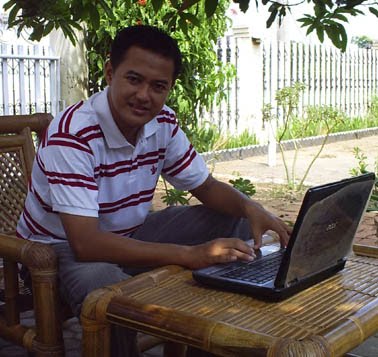Wilujengan Karo
It's done at 7th the second month, for the "atman" or the ancient soul and at "panglong 1" , there is "sodoran ceremony". Actually, Raya Karo (The Great "Karo") day is the most important day for Tenggerese. It's done in turn in every villages
When celebrating, there's a sacre dance and it's called by "sodoran". This dance is as a symbol of human beings movement to get the children. Sodoran ceremony is only done in the three villages, these are Ngadisari, Wonotoro and Jetak village. It's done every year and only held by three village in the Balai Desa (village office)
They are combined and dance together
Each village dances this ceremony and lead by village leader. He/she is called by "Ratu" (queen) in scare dance for respecting. to go to the ceremony place, the villagers group walk together with wearing dress uniforms of Tengger, they are head band (it's called by "Udeng"), shirt, and black boat, troussers, everything must be in black / dark color, shoes /sandal). Villagers dance with traditional music. Sodoran dance is held in turn and ended by the quenn dance and their guard. They dance with "gamelan music". Tenggerese count the date every month to 15th only, and the following 16th, 17th and 18th and soon by "Panglong Siji" by panglong siji (first panglong), panglong 2 up, panglong 3th and so on. Beginning from panglong 2 up to panglong 7 (17th to 22nd), the ceremony is continued at each house by making a little cone of boiled rice, all sorts of side - dishes, many kinds of flowers, cakes and food, coffee, cigarette, sirih - quid, king banana and etc. These are followed by "dukun" (medicine man) from a house to others to give charms ("mantra"). It's usually finishes for three days.
This ceremony then is continued by visiting their relative or neighbour. It will be ended at panglong 7 and before panglong 7, people must visit to grave or "nyadran". They give boresh-flower or callde by "tetamping / sesaji" at the grave. During Karo Day, who ever who came to Tengger must get, eat and drink (reception). If they reject, they are considered they did not respect the host. Because it also invites many families, so they have no eaten as much as they want. Because it will make them can not give food for the last guest.
Wilujengan Kapat
It's done at 4th in the fourth months for celebrating "sedulur papat limo pancer" (brotherhood), "momong jangkung or momong dusun" (person who keep the village) and "monco papating dusun" (the main direction of villages). It's held in "Balai Desa" (village office)
Wilujengan Kapitu
It's done at 1st in the seventh months. Holding this, people must do "patigeni fasting" where they do not be allowed to eat and sleep for one day, stay all day in the room (not going anywhere) and continued by "puasa mutih" (white fasting). For food, they just eat rice and water for one month and ended by "patigeni fasting". This fasting is usually done by "pamong desa" (village leader) such as "dukun" (medicine man) and "wong sepuh" (legent old man)
Wilujengan Kawolu
It's done at 1st in the eighth months. It's for celebrating the earth, water, fire, wind, sun, moon, star, and outer space. "Sesaji" (the requirement to the ancient, so we will get what we want) at Wilujengan Kapat, Wilujengan Kapitu and Wilujengan Kawolu is the same as at Wilujengan Karo. Differences is only in the charm's words
Wilujengan Kasanga
It's done in the nineth months, for celebrating "Babakan Hawa Sanga". It's meant these are nine hole in the human body like mouth, ears, nose, sex, bust, center, bottom, eyes and sweat. This ceremony is for taking care of country / village. "Sesaji" (present) is like Wilujengan Kapat, Kapitu and Kawolu, but it is added by one chicken more, it's gone around the village together and then the chicken is cut and plant in the garden of villages leader
Wilijengan Kasada
This is the very famous ceremony, a lot of people from Indonesia and foreign come to Bromo to see this ceremony. Very sacred and interesting in procession. It's held in the twelveth when full moon. The place is in the "Poten" (Hindusm Pura) and called by "Yadnya Kasada". This's a great heritage in religion ceremony, the relic of Majapahit Kingdom (ancient period) which it keep be eternal until today. If you would like to follow this ceremony completely, it's meant you dress with Tenggerese fashion, you may as the permission to the village leader or medicine man. And usually, they allow you to be as Tenggerse in this program
















Wan, don't get bore to improve your blog everyday,make your blog to be favourite one in the world....OK ??
Best regard,
Slippery Sugiarto
Indonesia
Finally blog with usable informations.